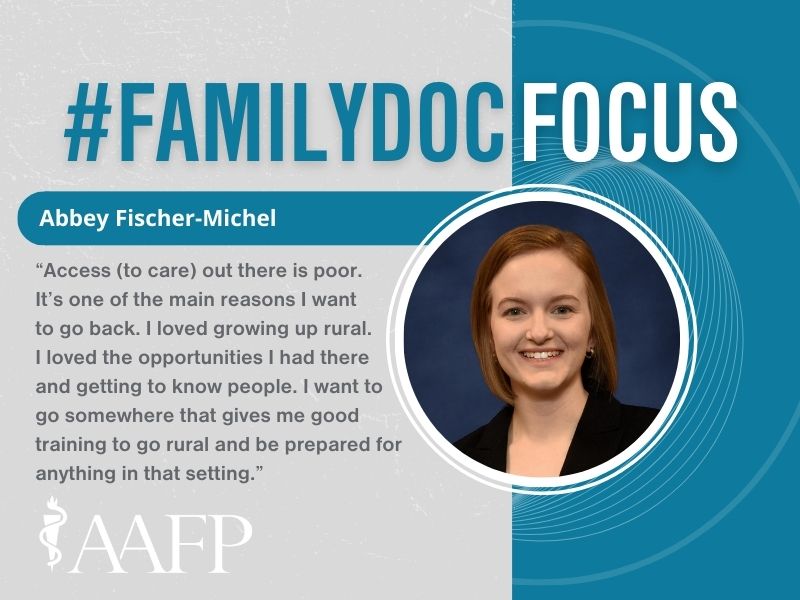Student Leader Plans to Return to Rural Roots
July 24, 2024, David Mitchell — Roughly 1 million Kansans, a third of the state’s population, live in rural areas. That’s not surprising given that farmland covers nearly 90% of the state’s 82,277 square miles. Though the Sunflower State has more than 100 rural hospitals, less than half offer labor-and-delivery services.

When a hospital near Abbey Fischer-Michel’s rural hometown stopped delivering babies, it meant patients had to travel at least 40 minutes to an hour to reach an alternative.
“I hate to see that when I know people out there still need care,” said Fischer-Michel, a fourth-year student at the University of Kansas School of Medicine, Wichita, who grew up on her family’s farm in Leoti. “Access out there is poor. It’s one of the main reasons I want to go back. I loved growing up rural. I loved the opportunities I had there and getting to know people. Everyone knows everyone.”
It’s a short list. Leoti is home to about 1,500 people, less than a third of the size of Colby, where Fischer-Michel did her family medicine rotation in a setting that does deliver babies.
“I loved it,” she said. “I loved getting to do clinic, hospital, every kind of medicine.”
Fischer-Michel already was leaning toward family medicine when she entered medical school because she wants to practice in a rural area. Participating in her school’s family medicine interest group solidified that decision. By her second year, she was serving on the board of the FMIG, which will be honored as a Program of Excellence during the AAFP’s National Conference of Family Medicine Residents and Medical Students, Aug. 1-3 in Kansas City, Mo.
At least a dozen KU Wichita students are expected to attend National Conference. More than 20% of students from KU’s Wichita campus match in family medicine each year.
Fischer-Michel, the FMIG’s president, said one of the keys the program’s success is the structure of its Board of Directors.
“We have a president, vice president and treasurer, all those things, but we also have board positions linked to most of the big events that we have throughout the year,” Fischer-Michel said. “For example, we have a Doc for a Day event, which is a big deal that requires a lot of set up, but we have co-coordinators for that event who serve on our board. I think that helps our big programs keep going. The FMIG was set up well. It’s easy to take over and run. It’s been like this for years and it works out well. We try to get new people involved, which brings new ideas and new events.”
Fischer-Michel said the FMIG also has outstanding support from advisers Tessa Rohrberg, M.D., FAAFP, and Lynn Fisher, M.D., FAAFP, as well as the school’s Department of Family and Community Medicine.
“If we have a new idea that we want to implement, they’re going to help us figure out how to make it a reality,” said Fischer-Michel, who also is the lead of a Primary Care Leadership Collaborative project designed to implement universal depression and anxiety screening in the school’s student-run clinic. “The students really buy into it, and they love the programs that we do.”
Fischer-Michel, who will participate in the National Resident Matching Program this year, will spend some of her time at National Conference visiting with residency programs in the Expo Hall.
“I want to go somewhere that gives me good training to go rural and be prepared for anything in that setting,” she said. “The only thing I really know right now is that I want to stay in the Midwest for residency.”
After residency, Fischer-Michel said she wants to return to Western Kansas. Her career options there might be expanding. The hospital that closed its labor-and-delivery unit has announced plans to resume maternity care next year, thanks to the recent hirings of two family physicians.